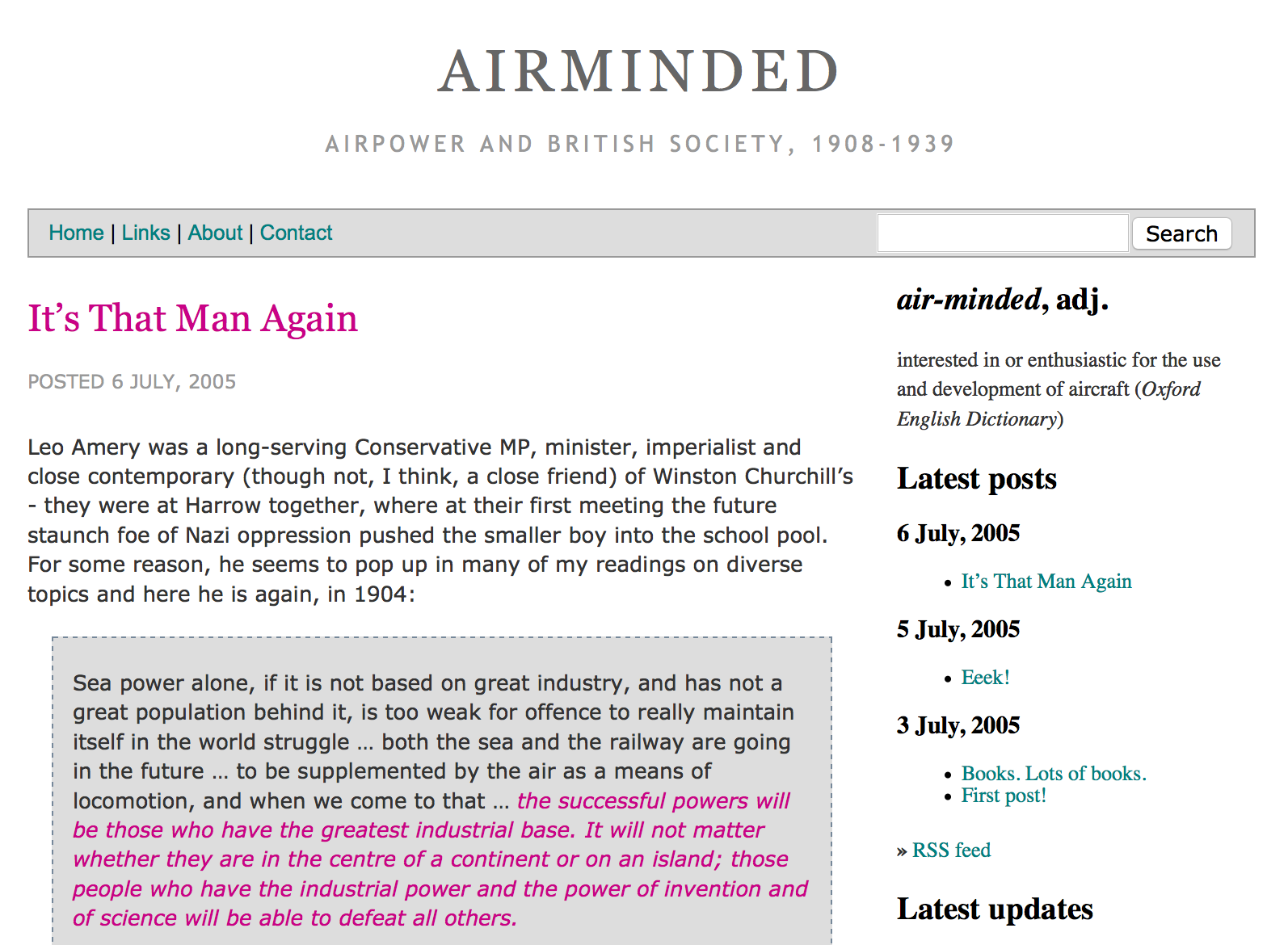
It’s 10 years to the day since I put up Airminded’s first post, imaginatively entitled ‘First post!’ That is a long time ago, a very long time in internet years. Still, Airminded wasn’t one of the first history blogs. In fact, Ralph Luker (of Cliopatria fame, alas long since retired from blogging) made a start on writing the history of history blogging two entire months before Airminded even began. Ralph identified Kevin Murphy as the first bona fide historian blogger: Kevin’s Ghost in the Machine began in 1999 (in the last millennium!) and is still going strong, though it’s not so much about history these days. King of the geek/historians Rob McDougall started on 1 January 2001. Rebecca Goetz started in July 2002 (as she recounts in her own recollections, conveniently published just last month); Tim Burke started in November. Mark Grimsley started the precursor to War Historian (for a long time the military history blog) sometime in 2003. Cliopatria itself, which in many ways became the centre of the history blogging community, or at least its central clearinghouse, started in December 2003. All these history blogs and bloggers were well-established by the time I came along, or indeed before I was really aware of blogging at all. So by starting a history blog in 2005, I was merely joining a swelling crowd.
The only sense in which Airminded might have stood out from that crowd in any sense (apart from being non-American) was in being resolutely, well, airminded. Most of the history blogs I was aware of when I was thinking of starting my own were much more personal or political than I wanted to get — they were written by historians trying to make sense of academia, or trying to make sense of the world outside academia. I wanted my blog to be much more about trying to make sense of history, the history I was researching. In other words, Airminded was to be a history research blog. (About airpower and British society. Mostly.) But again, I wasn’t the first to think along these lines — Miriam Burstein’s Victorian literature blog, The Little Professor, was definitely an inspiration for me; Esther MacCallum-Stewart’s (much-missed!) Break of Day in the Trenches was at least three years old; Alun Salt was already around, somewhere (and still is, I’m very glad to say); Sharon Howard’s Early Modern Notes was also well-established; a few months after Airminded, Kevin Levin’s research blog, Civil War Memory, independently came out of a strong American Civil War blogging community, but soon set the standards for everyone to emulate (or try to).
I didn’t always keep to my original vision — I quickly pulled back from putting everything I was doing or thinking out there (and blogged about that, of course; I never did do anything with the idea I was so concerned to protect, something about interwar robotic warfare, I think) and I did comment on academia, memory, and sometimes even politics. In any case, history blogging as a whole has changed: as Becky notes, much of its conversation and spontaneity (and procrastination) has moved elsewhere, especially Twitter, for good or ill. And, naturally, Airminded has evolved along with my career; teaching is not conducive to serious blogging, at least not if you’re me. But I think my blogging has created a profile for myself which I would not otherwise have had as a junior scholar in a remote part of the academic world. I’ve even worked out how to turn research blogging into research publications (at least sometimes). On the whole, Airminded has remained largely about my research, one way or another, and I’m pretty pleased with the way it has turned out.
Airminded has always been a big part of my scholarly identity. I started it a month before I started my PhD; ten years, 1426 posts, 873000 words (not to mention 6850 comments — thank you! Most of you, anyway…) — and one thesis, five peer-reviewed articles, and one scholarly monograph — later, I’m coming towards the end of my first academic position, and Airminded will still be with me, whatever happens after that. (Take that as a promise or a threat, as you like!)
To celebrate Airminded’s tenth birthday — not having done much for its first or its fifth — I’m going to take a leaf out of Sharon’s blog and repost some of my favourite Airminded posts over the next little while. And for anyone who makes it through all of that, there might even be a surprise.
Image source: via Wayback Machine.
![]() This work is licensed under a Creative Commons Attribution-NonCommercial-NoDerivatives 4.0 International License.
Permissions beyond the scope of this license may be available at http://airminded.org/copyright/.
This work is licensed under a Creative Commons Attribution-NonCommercial-NoDerivatives 4.0 International License.
Permissions beyond the scope of this license may be available at http://airminded.org/copyright/.




Pff. The first Romanian military history blog started in 1922.
Hey, nice work — ten years! Your work is a source of continued fascination at this end, for which many thanks.
Erik:
Yes, well obviously I know that now…
Paul:
Thanks! I’m glad you’ve stuck around.
I’m tempted to troll Brett some more, but what people don’t realise is that the trolling at Airminded all originates from French sites.
Also, is anyone else amazed that Leo “Speak for England” Amery’s son was executed for treason in 1945? I honestly had never heard a peep about it.
Happy Birthday, Airminded from all your regular readers living in Ballarat. Congratulations on 10 years of such interesting reading, you must be proud of yourself.
Congratulations on your tenth birthday Airminded!
I won’t resist the temptation to point out to Erik that whilst all the trolling is done from French sites, it is done by Germans who are taking advantage of the pre-existence of those sites. Had the French only not put up the sites in the first place . . .
Pingback: Repost: The Scareship Age | Airminded
Congratulations! Ten years is indeed a mile stone to be proud of.
At this stage I think blogging still has an important role that is not filled by Facebook or Twitter. I found this post because I wanted to find out what the #AAEH2015 hashtag was about. The Twitter stream didn’t explain it. I checked your post about the conference and then flicked through your recent posts.
Blogging is more reflective and considered so stands up as a better source of information than social media. But social media is a great source of the hyperlinks and brief comments that refer people to blogs.
You must have been one of the first Australian historians to start a history blog. I wonder when Tim Sherratt started blogging?
Thanks, everyone (including my baby brother!), for the further well-wishes.
Erik:
John Amery’s trial and execution certainly wasn’t covered up, and there have been a few books about it, which I guess does raise the question of why it isn’t better-known. Not every day that former Cabinet ministers have sons executed for treason.
Yvonne:
Yes, blogging still has a role, especially for longer and/or reflective posts or ideas. (And you remind me that I must write something about AAEH 2015!) But it’s definitely changed, and that’s a bit sad. I suppose I must have been one of the first Australian history bloggers? Back in 2006 I wrote a post about Australian history blogs. David Tiley’s Barista came earlier, but was never mostly about history, as I recall; Geoff Robinson and Bibliodyssey came a year or two later, it seems (and are both still going strong). I can’t remember anything else that early. I do remember feeling like the Australian representative to the rest of the historioblogosphere, and having some sort of responsibility to talk about Australian things even though it wasn’t my area at all.
“Not every day that former Cabinet ministers have sons executed for treason.”
His other son, Julian, also became became a Cabinet Minister. Appropriately enough for Airminded he was Secretary of State for Air (1960–1962) and Minister of Aviation (1962–1964).
Pingback: Repost: Australia forgets | Airminded
The three Amerys were the subject of a fairly comprehensive-looking biography a few years back – Speaking for England, by David Faber (2007). I have not yet read it but keep meaning to.
The trial was certainly carried out very quickly (helped by John pleading guilty) and I think both Leo and Julian avoided talking about it in later life (this probably would be impossible in modern politics!), but I’d agree “hushed up” isn’t really the appropriate term…
Pingback: Repost: On ‘the Few’ | Airminded
Pingback: Repost: The first death of Roland Garros | Airminded
Pingback: Airminded: the PhD thesis | Airminded
Nick, Andrew:
Thanks for the further information. I think I may have come across Speaking for England — good title, though of course it was Arthur Greenwood, the deputy Labour leader, who took up Leo’s challenge to ‘speak for England’ on 2 September 1939.